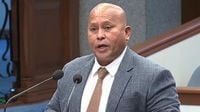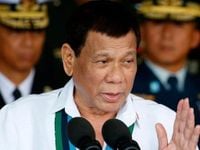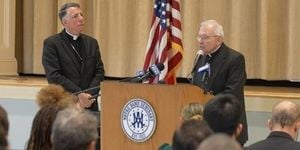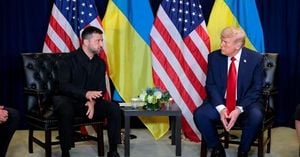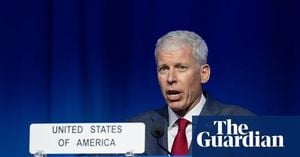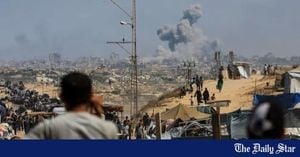On September 24, 2025, a seismic shift reverberated through the Philippines’ political and legal landscape as former Philippine National Police (PNP) chief Gen. Nicolas Torre III publicly voiced his support for the International Criminal Court’s (ICC) charges of crimes against humanity against ex-President Rodrigo Duterte. Torre’s statement, which cited a dramatic spike in killings during anti-drug operations after Duterte took office, has intensified the already heated debate over accountability and justice in the country’s controversial war on drugs.
Torre, who served as chief of the Regional Operations Division of Police Regional Office 3 (PRO3) at the time Duterte assumed power, didn’t mince words. “For me, Duterte’s ‘kill, kill, kill’ policy is clearly reflected in these numbers,” Torre wrote in a Facebook post, as reported by Cebu Daily News. “He must answer to the families of Filipinos now seeking justice before the ICC.”
His assertion is grounded in official data that paints a stark picture. From January to March 2016, before Duterte’s inauguration, police arrested 1,202 suspects in anti-drug operations, with no reported deaths. The following quarter, between April and June, saw 10 suspects killed out of 1,074 arrests—less than 1 percent. But after Duterte was sworn in on June 30, 2016, the numbers shifted drastically. In July alone, 120 suspects were killed and 1,121 arrested, meaning nearly 10 percent of those apprehended lost their lives. For the entire third quarter of 2016, 271 suspects were killed out of 3,368 arrested—about one in every 13.
These figures are more than just statistics; they represent a profound change in policing and human rights, one that has drawn fierce scrutiny both domestically and internationally. According to #RealNumbersPH, the government’s data initiative led by the Philippine Drug Enforcement Agency (PDEA), authorities conducted 239,218 anti-illegal drug operations, arrested 345,216 people, and reported 6,252 deaths during these operations from July 1, 2016, to May 31, 2022. Yet, advocacy groups claim the real death toll could exceed 30,000 when vigilante-style killings outside official police operations are included.
The ICC has charged Duterte with three counts of murder, alleging he formed a death squad responsible for the brutal killings of suspected drug users, dealers, and alleged syndicate members. The charges cite 49 incidents of murder and attempted murder spanning Duterte’s time both as Davao City mayor and as President. The Philippine Drug Enforcement Agency’s 2016 annual report further highlighted the scale of the campaign: 34,077 anti-drug operations that year, including 21,655 buy-bust operations and 305 large-scale raids targeting major drug lords and laboratories.
Duterte, who has consistently denied any wrongdoing, was arrested in the Philippines on March 11, 2025, pursuant to an ICC warrant. He is currently detained in The Hague, awaiting a confirmation of charges hearing that was postponed after his defense claimed he was unfit to stand trial. His lawyer, Nicholas Kaufman, has stated that the former president is unable to recall events, places, timing, or even close family members—a claim that has added a new layer of complexity to the proceedings.
Senator Ronald “Bato” dela Rosa, the first PNP chief under Duterte and the lead implementer of the anti-drug campaign, has also found himself in the ICC’s crosshairs. On September 25, 2025, Dela Rosa told reporters he is prepared should the ICC issue a warrant of arrest against him. “I am ready,” he said, as reported by ABS-CBN and GMA Integrated News. His name appeared in the prosecution’s pre-confirmation brief, underscoring his central role in the campaign that, according to official records, resulted in at least 6,000 deaths—though human rights groups estimate up to 30,000 fatalities.
Dela Rosa’s readiness to face the ICC did not overshadow his deep emotional response to Duterte’s current predicament. During a Senate plenary session, he delivered a privilege speech lamenting the former president’s detention in The Hague. He fiercely criticized a welfare check conducted by officials from the Philippine Embassy, echoing concerns previously raised by Vice President Sara Duterte. “What kind of welfare are they trying to ascertain and whose?” Dela Rosa asked. “Bold of them to assume that they are in any position to look into his well-being, when in the very first place, securing his well-being should have meant utmost respect for his person, as well as refusal to surrender him to a foreign court. Not because he was the 16th President of the Republic, but perhaps more importantly, because he is a Filipino.”
The senator further questioned the intent behind the embassy’s visit, expressing frustration that Duterte’s family was not notified. “You already had him forcibly seized for foreigners, you will visit him in prison without informing his family? Isn’t that adding insult to injury? Can’t you, just for a while, cut the old man some slack?” he remarked, as reported by GMA Integrated News.
Vice President Sara Duterte was unequivocal in her response: their family, not the Philippine government, would take care of the former president. The Department of Foreign Affairs (DFA) countered that the welfare check was consistent with its responsibilities under the Vienna Convention on Consular Relations and Philippine law, emphasizing that “this is a duty of all Philippine Foreign Service Posts and is no different from what the DFA does for other Filipino citizens in detention abroad.”
Other senators allied with the Duterte family, including Bong Go and Rodante Marcoleta, voiced concerns over the embassy’s actions. Bong Go cautioned that the visit, lacking transparency and coordination with Duterte’s immediate family, might undermine the integrity of diplomatic services. Marcoleta speculated that the welfare checks may have been motivated by concerns over Duterte’s alleged cognitive impairment.
The confirmation of charges hearing for Duterte, initially scheduled for September 23, was postponed after the defense claimed he was unfit to stand trial. The ICC’s case against Duterte remains a lightning rod for controversy, with the Philippine government so far refusing formal cooperation, despite mounting pressure from rights groups and the families of victims.
The stakes are high. On one side are those demanding accountability for thousands of deaths and alleged extrajudicial killings. On the other are Duterte’s supporters, who see the ICC’s actions as an affront to Philippine sovereignty and a betrayal of a leader they view as having acted decisively against crime. The debate has exposed deep divisions within the country’s political establishment and society at large.
As the ICC proceedings unfold, the world watches. The outcome will not only determine the fate of Rodrigo Duterte and his top lieutenants but may also set a precedent for how nations confront questions of justice, accountability, and the rule of law in the face of grave allegations. For now, the Philippines stands at a crossroads, its next steps likely to echo far beyond its shores.

